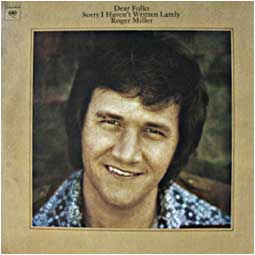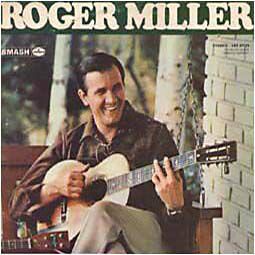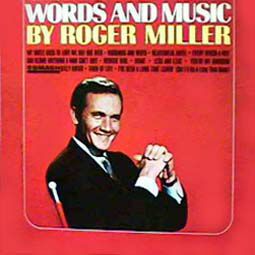


ROGER MILLER
Roger Miller was born
in Fort Worth, TX. Initially, he was attracted to music by hearing country over
the radio as well as by his brother-in-law, Sheb Wooley. By the time he was ten,
he earned enough money picking cotton to buy himself a guitar. At the age of 11,
Wooley gave him a fiddle and encouraged him to pursue a performing career.
Soon, he was able to play not only guitar and fiddle, but also piano, banjo, and
drums.
He enlisted in the Army during the Korean war and was stationed in South
Carolina, where he met the brother of Jethro Burns who arranged an audition at
RCA Nashville for him. Early in 1957, Miller left the army and auditioned for
Chet Atkins at RCA. The session was unsuccessful, and he spent a year as a
bellhop at a Nashville hotel. While in Nashville, Miller met George Jones and
Pappy Dailey, who introduced him to Don Pierce, an executive at Mercury Records.
Pierce signed Miller and had him cut three songs. In 1958, Price recorded
Miller's "Invitation to the Blues," and it went to number three. It was soon
followed by three other successful versions of his songs — Young's "That's the
Way I Feel" and Ernest Tubb's "Half a Mind" both went Top Ten, while Jim Reeves
had a number one hit with "Billy Bayou." That same year, Jones recorded "Tall
Tall Trees" and "Nothing Can Stop My Love," which he had written with Miller;
neither of the songs were hits. The following year, Reeves had a hit with
another one of Miller's songs, "Home."
Since his songwriting career was flourishing, Miller decided it was again time
to try to become a performing artist as well. "You Don't Want My Love," one of
his first singles, reached number 14 in early 1961, followed by the Top Ten "When
Two Worlds Collide" later that summer. Miller wasn't able to immediately follow
the songs with another hit single. Two years later, "Lock, Stock and Teardrops"
scraped the charts, and he left the record label.
Around that time, Miller moved to Hollywood and began appearing regularly on The
Jimmy Dean Show and The Merv Griffin Show, two of the most popular television
programs in the country. His guest spots showcased his new style — instead of
concentrating on hardcore country, he had developed a willfully goofy persona,
singing silly novelty songs. He signed a record contract with Smash Records and
released his first single for the label, "Dang Me," in the summer of 1964. It
was an immediate smash, vaulting to number one and spending six weeks at the top
of the charts; it also crossed over into the pop charts, peaking at number seven.
"Chug-a-Lug" followed a few months after it, reaching number three on the
country charts and nine on the pop charts. At the end of the year, "Do-Wacka-Do"
was released, becoming a number 15 hit.
Miller began 1965 with his best-known song, "King of the Road." The single spent
five weeks at the top of the country charts and became his biggest pop hit,
peaking at number four. Its accompanying album, The Return of Roger Miller, was
another crossover success, also peaking at number four on the pop album charts
and going gold. Miller was at his peak in 1965. Every song he released that year
— "Engine Engine #9," "One Dyin' and a Buryin'," "Kansas City Star," "England
Swings" — reached the country Top Ten, and at the end of the year, his Golden
Hits album went Top Ten; it would eventually go gold.
After the watershed
year of 1965, Miller's career dipped slightly. Although other artists were still
having hits with his songs — Eddy Arnold took "The Last Word in Lonesome Is Me"
to number two — Miller had trouble breaking the Top 40 following the number five
hit "Husbands and Wives" in early 1966. He continued to record throughout the
late '60s, but fewer and fewer of the songs were becoming hits. Toward the end
of the decade and beginning of the '70s, he began to concentrate on honky tonk,
although he still made his trademark novelties.
During the '70s, he recorded sporadically, preferring to concentrate on his
hotel chain, appropriately called King of the Road. "Tomorrow Night in
Baltimore," released in the spring of 1971, was his biggest hit of the decade,
climbing to number 11. In 1973, he left Smash/Mercury for Columbia
Records. He spent four years at Columbia and only his debut single for the label,
"Open Up Your Heart," was a hit, peaking at number 14.
In 1991, he was diagnosed with throat cancer and died a year later.


